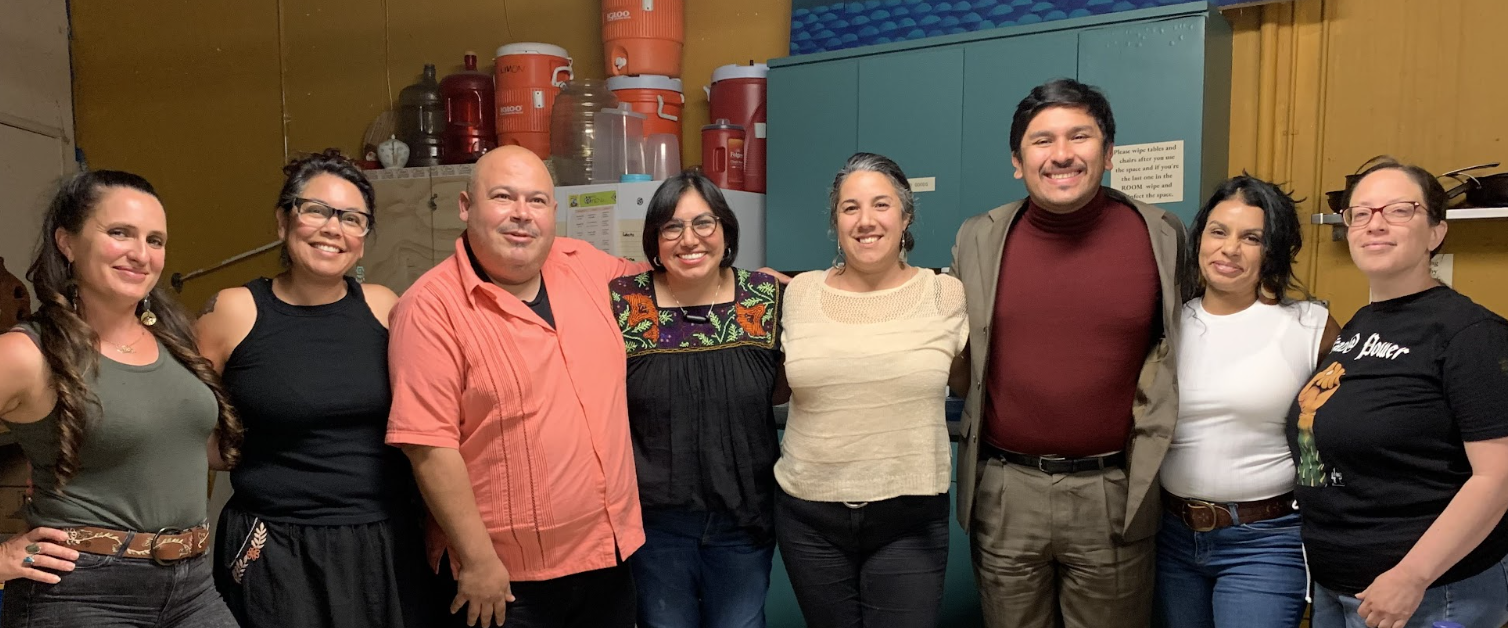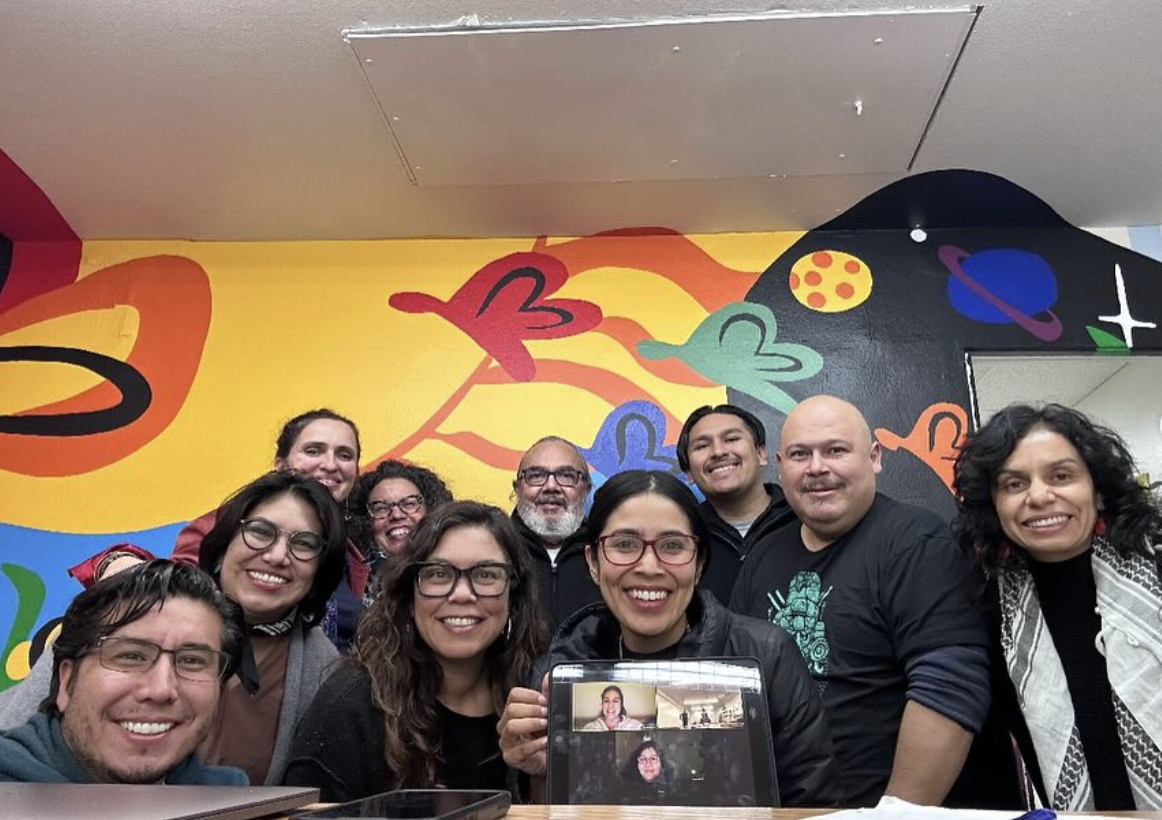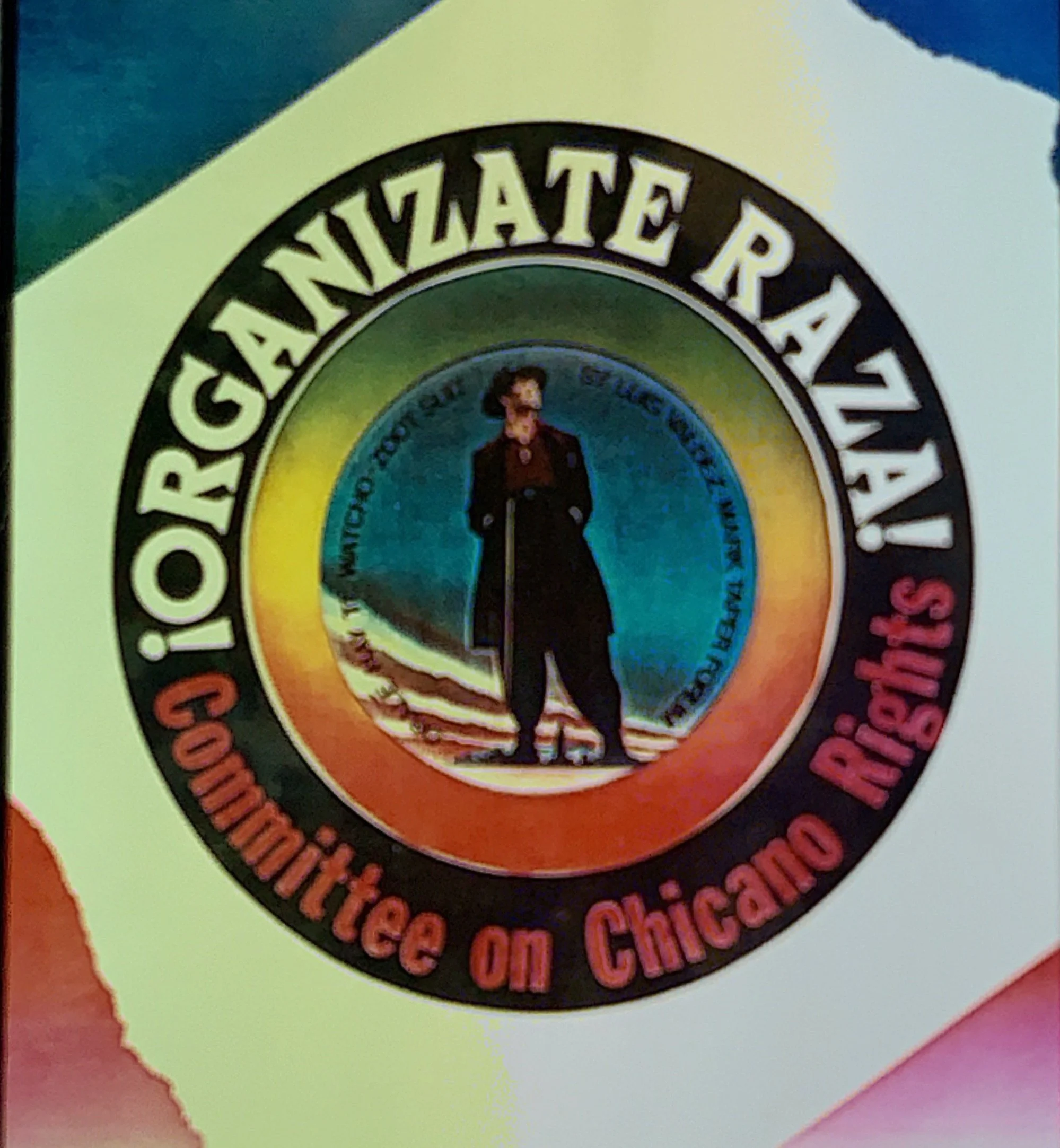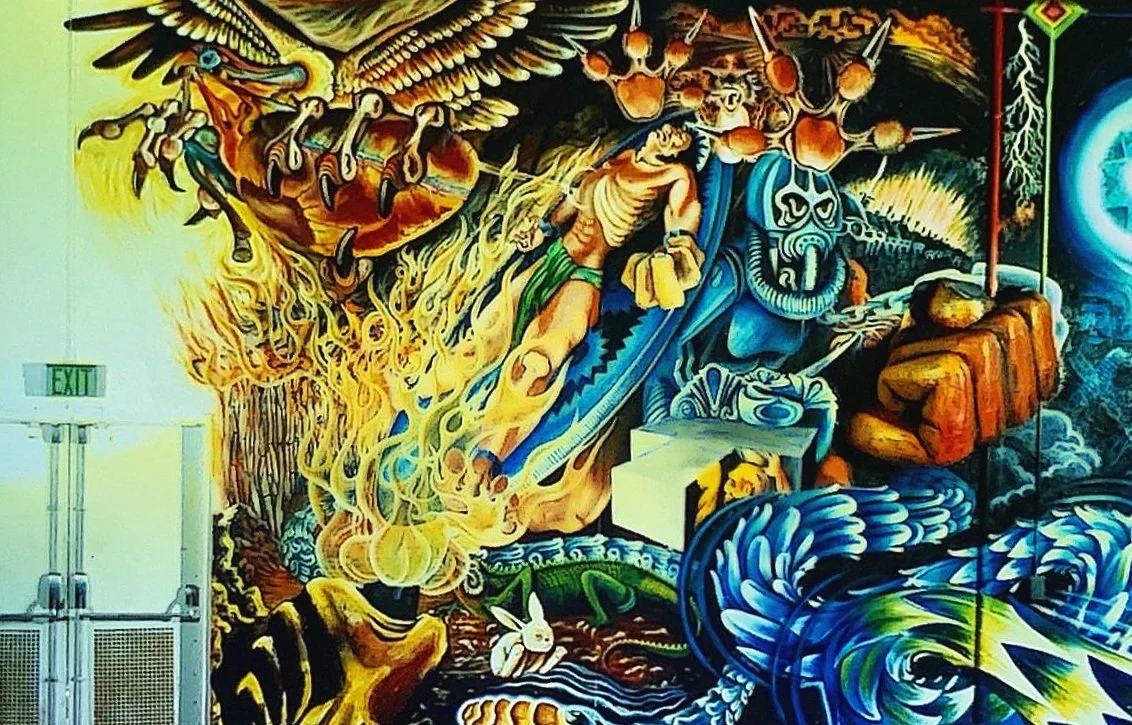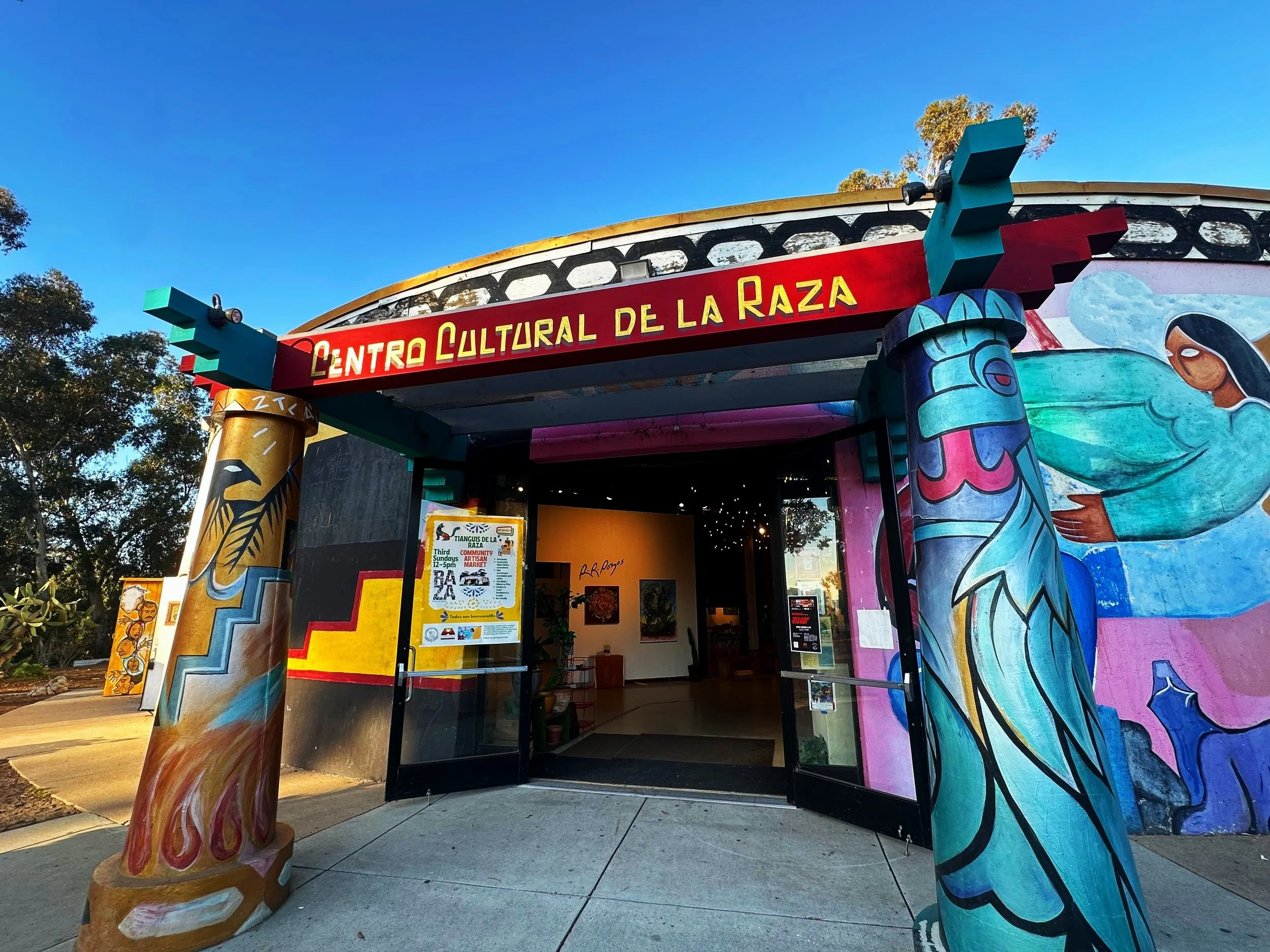OUR PURPOSE AND VISION
Our Mission
San Diego's Centro Cultural de la Raza was founded in 1970 as a Chicano Community Cultural Center and functions as an alternative space that encourages and facilitates artistic
growth and cultural exchange in the San Diego/Tijuana border region.
The Centro provides classes and features a dynamic interdisciplinary schedule of events, including exhibits, musical performances, installation art, readings, receptions,
Azteca dance, Puerto Rican Bomba, Teatro Chicano, Ballet Folklorico, film screenings, and other events. We welcome you to visit the Centro and invite you to participate in the exciting programs.
OUR TEAM
Centro Board (Nov 2023), L to R: Dr. Jade Power Sotomayor, Maria Figueroa, Dr. Roberto D. Hernández, Ymoat Luna, Amelia Enrique, Esau Cortez, Dr. Norell Martinez, Teresa Ortega
Centro is powered by the passion and dedication of our community. While we’ve recently welcomed a few staff members, our work continues to be led by the tireless efforts of committed volunteers who show up every day to support and uplift our mission.
BOARD OF TRUSTEES
Centro Board (Dec 2024), L to R: Sage Soledad, Ymoat Luna, Dr. Jade Power Sotomayor, Ana Hernández (Executive Director ), Maria Figueroa, Dr. Mario E. Aguilar, Karla Reyes (Operations Manager), Esau Cortez, Dr. Roberto D. Hernández, Dr. Norell Martinez
Our Board of Trustees guides Centro’s vision with wisdom, integrity, and a deep commitment to social justice. They provide strategic leadership, help secure resources, and ensure that our work stays true to the values and needs of the communities we serve.
What We’ve Achieved
Centro has been able to expand to three paid staff members in 2024! This is the first time in 13 years that we have full time paid staff.
Centro Cultural de la Raza, one of the nation’s longest running Chicana/o, Mexican, Indigenous and Latina/o/x cultural centers, has received half a million dollars from the Andrew W. Mellon Foundation, the country’s largest supporter of the arts and humanities.
-
The Centro has published exhibition catalogues, poetry series and children’s books. It is also referenced in a number of publications such as Made in Aztlan: Centro Cultural de la Raza, Fifteenth Anniversary, among others. The list below is a sample:
Maize poetry series
Tula y Tonan children’s book series
The Border Art Workshop, 1984-1989 Exhibition Catalogue
The Broken Line/La Linea Quebrada
La Frontera/The Border, Art About the Mexico/United States Border Experience
Fragmentos de Barro
Separate but Assimilated: Latino Immigrant Communities and their Museums
Rebozos of Love
Nationchild Plumaroja
“Immigrants in Our Own Land”: A Chicano Literature Review and Pedagogical ASSESSMENT
The Bronze Screen
Postborder City: Cultural Spaces of Bajalta California
Negotiating Performance
Globalization on the Line: Culture, Capital and Citizenship at US Borders
A Companion to CulturalSTUDIES
The Fence and the River: Culture and Politics at the U.S.-Mexico Border
Poor Dancer's Almanac
Race and Politics: Asian Americans, Latinos, and Whites in a Los Angeles Suburb
Mexicanos: A History of Mexicans in the United States
The Ethnic Eye: Latino Media Arts
Chicano Art Inside/Outside the Master's House: Cultural Politics and the Cara Exhibition
Rethinking Borders
The Expediency of Culture: Uses of Culture in the Global Era
Hispanic Spaces, Latino Places: Community and Cultural Diversity in ContemporaryAMERICA
Under the Fifth Sun: Latino Literature from California
Anglos and Mexicans in the Making of Texas, 1836-1986
More Adventures with Kids in San Diego
Dimensions of theAMERICAS : Art and Social Change in Latin America and the United States
Lonely Planet Coastal California
Chicano Drama: Performance, Society and Myth
The Latino Holiday Book: From Cinco de Mayo to Dia de Los Muertos: The Celebrations and Traditions
Calling California Home, A Lively Look at What It Means to Be a Californian
With Other Eyes: Looking at Race and Gender in Visual Culture
From Totems to Hip-Hop: Poetry Across the Americas, 1900-2002
Lowrider
De Paseo: Curso Intermedio de Español
Feminist Rhetorical Theories
LOCAL Motion: The Travels of Chicana and Latina Popular Culture
Barrio-Logos: Space and Place in Urban Chicano Literature and Culture
Urban Exile: Collected Writings of Harry Gambia Jr.
Breaking Boundaries: Latina Writing and Critical Readings
Race-Ingo Art History: Critical Readings in Race and Art History
A Hispanic View: American Politics and the Politics of Immigration
Women Making Art: History, Subjectivity, Aesthetics
CONTESTED Terrain: Diversity, Writing, and Knowledge
Radical Media: Rebellious Communication and Social Movements
San Diego: California's Cornerstone
Contemporary Trends in Landscape Architecture
Border Writing: The Multidimensional Text
Celluloid Nationalism and Other Melodramas: From Post-Revolutionary Mexico to Fin De Silo
MidAmerican
O Solo Homo: The New Queer Performance
Chicana Feminisms: A Critical Reader
Reading California: Art, Image, and Identity, 1900-2000
Space, Site, Intervention: SituatingINSTALLATION Art
Other Sisterhoods: Literary Theory and U.S. Women of Color
Shot inAMERICA : Television, the State, and the Rise of Chicano Cinema
more about Centro
Centro’s History
Raza Visions
Our Policies
Documents
GET IN TOUCH TODAY
For inquiries, collaborations, or to learn more about Centro Cultural De La Raza, feel free to reach out to us.
We welcome your feedback and support in our community endeavors.




